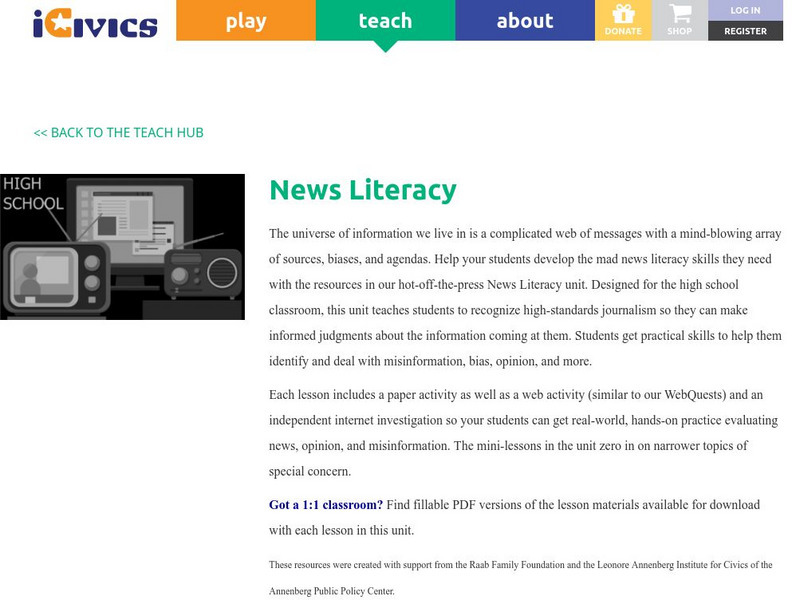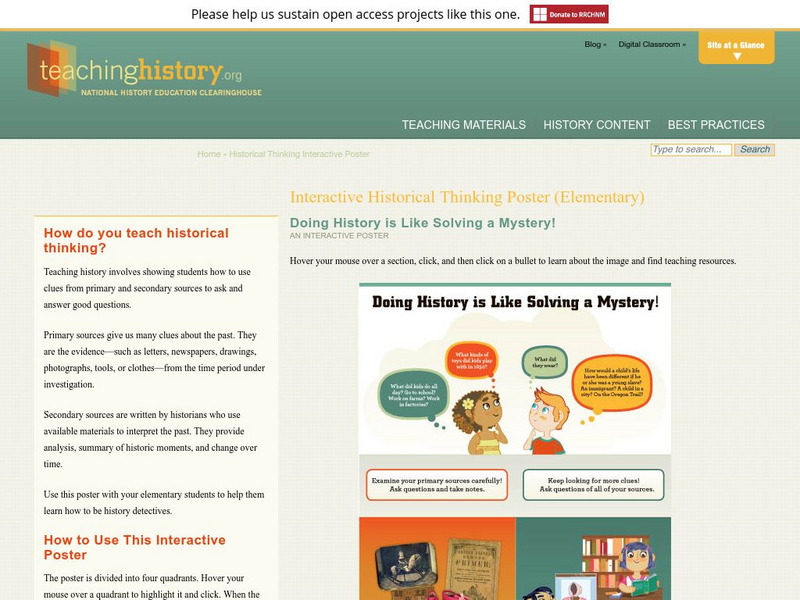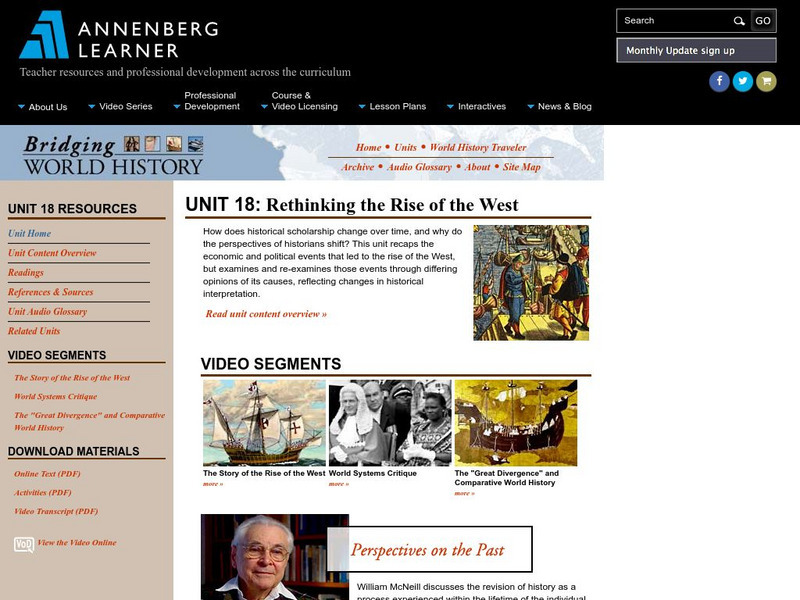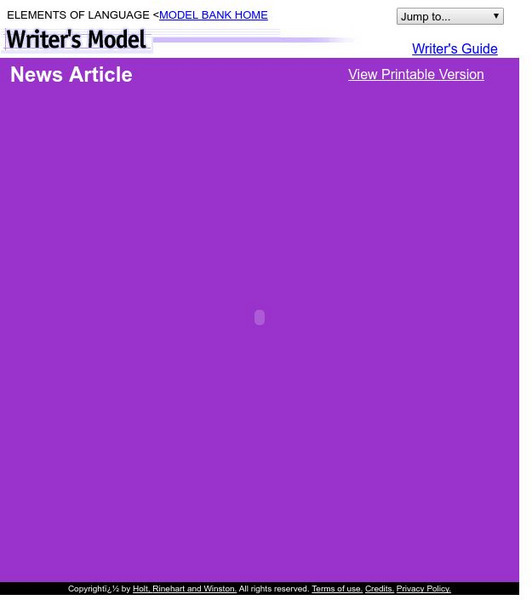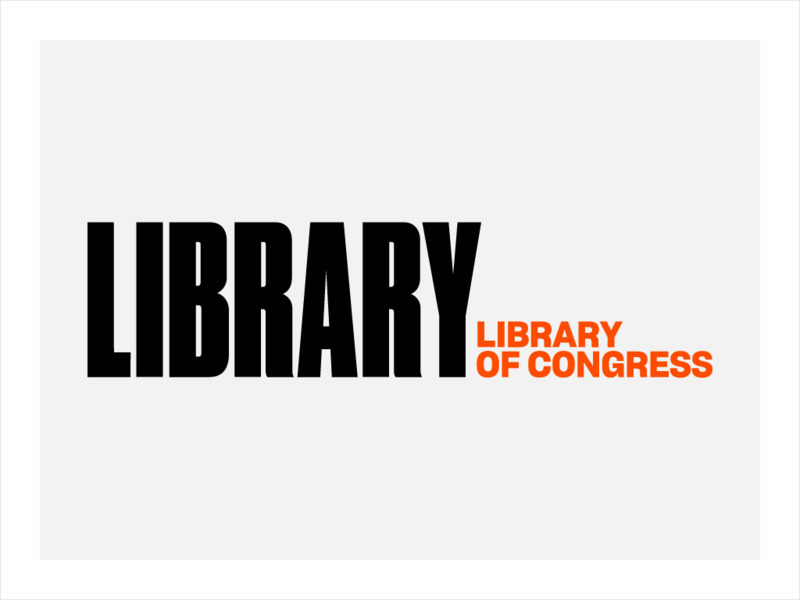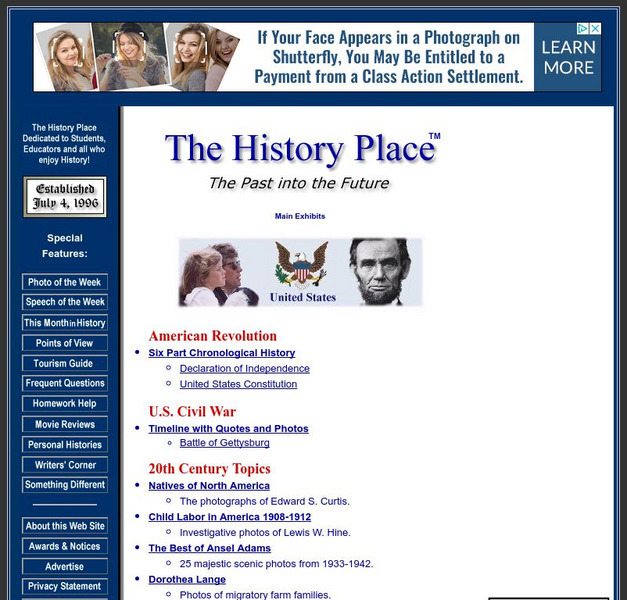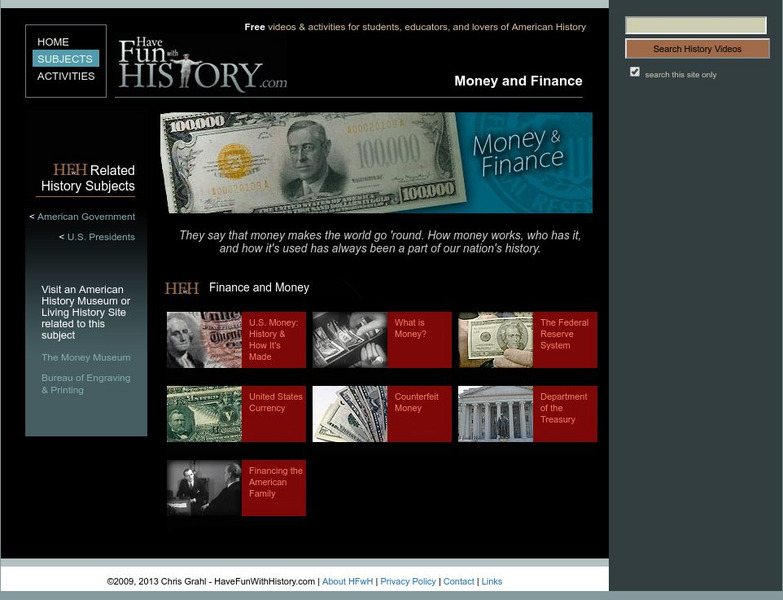PBS
Pbs: Empire of the Air: Power and Impact of Radio
Students will listen to historic news events as broadcast on radio, view current news coverage on television, and compare and contrast how those events were reported on both media by developing an essay which addresses the question "Is...
Other
Oslis: Research Process
Excellent site outlining each step for Internet research for grades 6-12. This site focuses on writing a research paper from selecting a topic through to the final paper. Click on Cite My Sources to get the electronic citation machines....
NBC
Nbc Learn
NBC Learn, the educational arm of NBC News, is dedicated to making historic stories, images, and primary source documents available on-demand to teachers, students, and parents.
iCivics
I Civics: News Literacy
Use this library of mini-lessons to teach students to recognize high-standards journalism so they can make informed judgments about the information coming at them and to help them identify and deal with misinformation, bias, opinion, and...
BBC
Bbc Bitesize Revision: Gcse: Newspapers
Tutorial on newspapers. Looks at types of newspapers, the language of newspapers, news sources, what has news value, marketing, distribution, circulation, readership, online newspapers, editorial stance, ownership of newspapers, and...
Roy Rosenzweig Center for History and New Media
Teaching History: Doing History Is Like Solving a Mystery!
Use this interactive poster to explore how students understand history and find resources about teaching historical thinking to students.
Annenberg Foundation
Annenberg Learner: Bridging World History: Rethinking the Rise of the West
Historical interpretation is subjective, and therefore views on particular movements, such as the western world's rise to power as covered in this unit, can be altered over time by historians.
Other
History of Alternative Journalism in 20th Century
This site contains a timeline of the history of alternative journalism beginning in 1900. Includes description & brief discusses of various alternative publications.
PBS
Pbs Learning Media: News and Media Literacy
This collection, which includes videos, blog articles, student handouts, lesson plans, and tip sheets for families, helps students identify, analyze, and investigate the news and information they get from online sources. Media literacy...
PBS
Pbs Learning Media: Why Is Fake News So Effective?
This lesson frames the controversial issues of fake news and trust in the media with the historical context of yellow journalism and sensationalist reporting. Students learn strategies for improving their media literacy and will be able...
PBS
Pbs Learning Media: Communicating at Work
In this interactive instructional activity, students will learn the importance of interpersonal communication skills, listening skills, and making a good impression. Students will gather information through reading, activities, and video...
PBS
Pbs Learning Media: News and Media Literacy Collection
This collection, which includes videos, blog articles, student handouts, lesson plans, and tip sheets for families, helps students identify, analyze, and investigate the news and information they get from online sources. Media literacy...
Houghton Mifflin Harcourt
Holt, Rinehart and Winston: Writer's Model: News Article Example
This two-page news article includes a left-hand column with pointers on placement of critical features. Clicking on the "Writer's Guide" link in the upper right-hand corner of the page enables the user to get tips, directions, and...
George Mason University
George Mason University: World History Sources: Material Culture: Images
Investigate the meaning of different cultures' images and materials. Learn to examine different questions such as what is the image, what is the meaning, what is the function, and what is the social condition.
Columbia University
Tips: Leads
One page document gives important pointers on writing news story leads. Part of a Columbia University site.
Library of Congress
Loc: Creating a Primary Source Archive: All History Is Local
A lesson plan where students collect local primary documents and examine the interplay between national, state, local, and personal history.
Digital History
Digital History: An Intro to the Study of History: The Four Questions [Pdf]
How does one study history? Find four basic questions that historians use to examine events in an effort to explain them and put them in historical context. By examining the Battle of Lexington and Concord, students can practice using...
Library of Congress
Loc: Oral History and Social History
This lesson presents social history content and topics through the voices of ordinary people. It draws on primary sources from the collection, American Life Histories: Manuscripts from the Federal Writers' Project, 1936-1940.
Library of Congress
Loc: Change in Early 20th Century America: Doing the Decades
This unit provides a flexible investigative structure for the study of selected themes in U.S. history and culture using the American Memory collections and related resources. Core goals are the development of relationships between...
Georgetown University
Georgetown University: News Values
Learn the essential elements of every good news story from Gerald Lanson and Mitchell Stephens, authors of Writing and Reporting The News, who emphasize eleven judgments that journalism students should make when evaluating newsworthiness.
The History Place
The History Place: The Past Into the Future: Main Exhibits
Informative website focussing on American history from the Colonial period to present-day. Many on-line exhibits include timelines, photographs and famous quotes.
Have Fun With History
Have Fun With History: Finance and Money
Module with video, activities and links to related resources explains basic concepts of money and finance, teaching us about the role of the Federal Rerserve System, U.S. Treasury and economics of the American family.
US National Archives
National Archives: Was Reconstruction a Revolution?
Students will use primary sources to answer the question "Was Reconstruction a Revolution?". Included are discussion questions, worksheets, primary sources, extension activities, and additional resources. [PDF]
Other
San State Francisco University: Newsworx (1001 Words)
View the media-rich work of teams of student journalists assigned to produce high-interest feature stories using pictures, audio, and words. Learn how to tell a story well by thinking critically about the different choices made by each...



